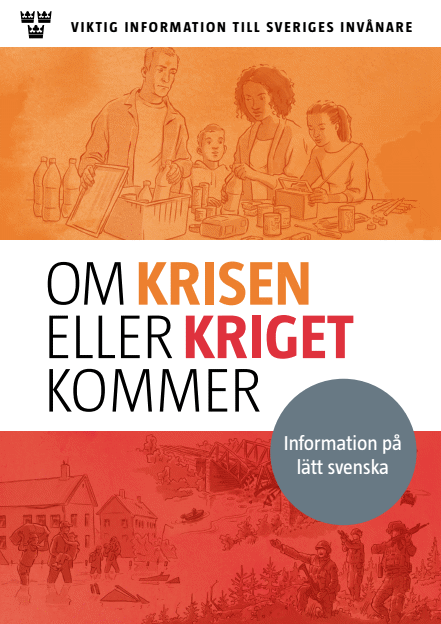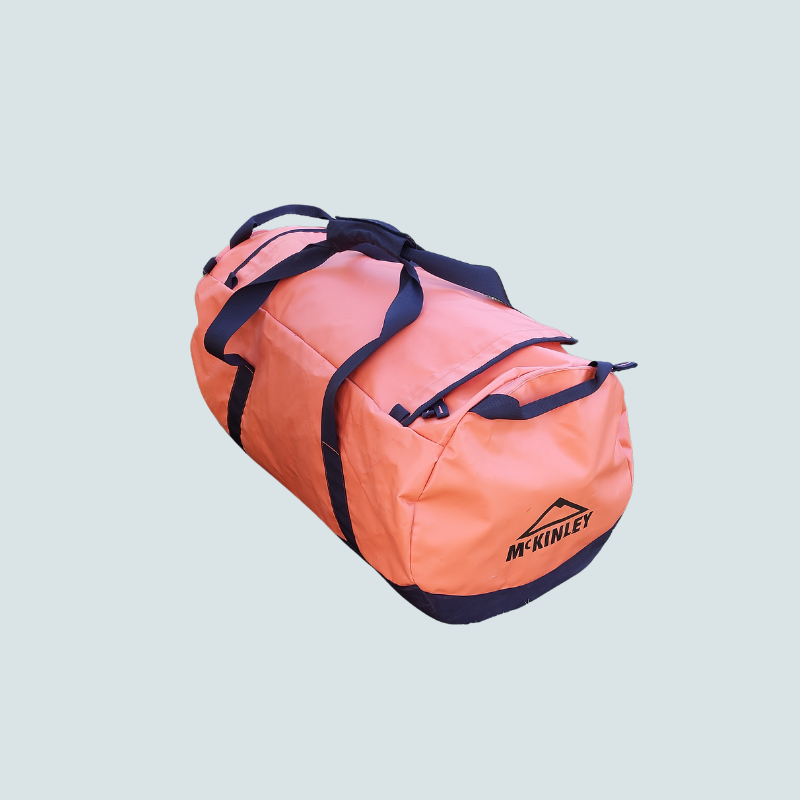Why do we need a new version?
A new version of the printed brochure “If crisis or war comes” will be sent out to all households in Sweden starting November 18th with digital versions also made available. It will amount to approximately 5 million printed copies.
The situation in the world has greatly deteriorated since the previous brochure was sent out in 2018. War continues to go on around the world, extreme weather is becoming more common. Terror threats, cyber attacks and misleading information are used to harm and affect the Swedish population plus Sweden has also joined the NATO defence alliance.
Against this background, the Swedish Civil Contingencies Agency the MSB (Myndigheten för samhällsskydd och beredskap) commissioned a new version of the brochure “If crisis or war comes”.
In the new brochure you will get advice on how to prepare yourself, and what to do if crisis or war comes.
From November 18, the brochure will be available digitally in several languages, in light Swedish, Swedish and English, sign language interpreted and in braille. When the printed brochure is launched on 18 November, it will be available in 11 different languages plus Swedish.


Link to new brochure: https://rib.msb.se/filer/pdf/30828.pdf
Greater focus on preparedness for war
The new brochure addresses more areas than the previous one from 2018 and has a greater focus on our preparedness for war. It gives clear and practical advice on how to prepare for both crisis and war and how to act if something serious happens.
It is not only war as a threat, the information is there to help to deal with other serious risks and threats, for example:
- Extreme weather
- Dangerous infections
- Disturbances in important IT systems
- Organised crime.
The objective is to increase the population’s resilience and ability to manage crisis and war, if something serious happens, help goes primarily to those who need it most. Most of us therefore have to be prepared to fend for ourselves for at least a week.



Total defence duty for everybody in Sweden
From the year you turn 16 up to and including the year you turn 70, you are liable for total defence and obliged to contribute to total defence in the event of war.
Total military duty applies to all Swedish citizens, both those living in Sweden and abroad. The total defence obligation also applies to foreign citizens living in Sweden.
What does total defence duty mean?
Military service or civil service. In the event of heightened alert, you are obliged to report to the location you have been notified of in your war deployment order.
General duty of service. If the government decides on general duty, you are obliged to continue to go to your work or perform other tasks that are important for total defence.
At high alert, you continue to go to your regular work unless you have another war deployment.
Buy Better Quality For Less
Different items arriving daily. New & Unused, and Second hand.
Focus on Home Preparedness
As citizens we must be able to look after ourselves, you and your family (and your pets!) for at least one week in times of crisis or war. That means food and drink but also if you use prescription medicine it’s good to have sufficient supply at home to get you through a week.
Water
When it comes to life’s essentials, with water you’ll need at least three litres of water per day, primarily for drinking and cooking.
Even if the local municipality has set up a water source you need to still have water stored at home that you keep in a dark and cool place. Check regularly if the water tastes and smells good once or twice a year or if you are unsure if the water is clean, boil it. You can also freeze water in PET plastic bottles.



Heat
Now that we are moving into the colder time of year, it is a good reminder that your home can get cold quickly if there is a power cut. The advice is to choose one room to be in, hang blankets over the windows and cover the floor with rugs. And keep warm with slippers, woollen clothing, thick socks, hats, mittens, and scarves. Plus keep at hand blankets, sleeping bags and matresses.
If you are able to use an alternative heat source that does not run on electricity, pay attention to safety, make sure you regularly aerate the area to bring in oxygen and remove any toxins from the air. To get you through the dark nights make sure you have candles, tea lights, fuel for heat sources, matches, fire lighters, a fire extinguisher and fire blanket.
Communication
You’ll need to be able to receive news and important information from the authorities so make sure you have a radio – powered by battery, solar cells or crank, plus extra batteries just in case. And even though there may not be a cell / mobile phone network keep your phone charged with a power bank or using a mobile charger in your car.
Keep you important contact telephone numbers on a piece of paper.
Sweden’s Radio P4 is a standby channel and continues to broadcast in the event of crisis and war. Find out the frequency of your local P4 channel at krisinformation.se.
Money (cash)
And when it comes to money, keep some cash aside for emergencies, it is good to have cash in various denominations just in case for example other payment solutions such as bank cards and digital services don’t work. We already experienced recently a digital payment system for many high street shops that was temporarily taken offline and meant many shops could not take credit card payments – so be prepared.



Food
To last for a week you’ll need food that fills you up, gives you energy and can be stored at room temperature which means a range of foods items that are quick to prepare, require little water to cook them or can be eaten immediately.
So, first stop would be to fill up on your regular visits to the supermarket with dry goods such as cereals, pasta, rice, couscous, powdered potato mash, powdered milk, tortilla, hard bread, crackers, salt, spices, etc. And to add some vitamins and protein, tinned tomatoes, fresh vegetables and fruits, and dried or canned meat and fish, chickpeas, beans, lentils, cheese in a tube.
Let’s not forget that we all need a little bit of an energy “pick me up” sometimes so make sure to have stored some jam, chocolate, honey, protein bars, and dried fruit. And to wash down those sweet treats you’ll need coffee, tea, chocolate powder, blueberry and rosehip soup, cordial to dilute and milk drinks.
Toilet
Last but not least, remember that if the water has been cut off you won’t be able to flush the toilet. You can pee in the toilet even if you can’t flush and dispose of the toilet paper in a bin or bucket with a lid. For faeces, you can put a plastic bag or garbage bag in the toilet or if you have it a bucket with a lid. Cover the excrement with, for example, compost or sawdust. Your municipality will let you know about how to dispose of the waste.
Make sure you have at home then, toilet paper, plastic bags or garbage bags, access to compost or sawdust and a bucket with lid, disposable gloves, wet wipes, hand sanitiser, and sanitary products.
And if you think that you’ll be out and about in the car, don’t forget to pack a mini-prep kit with a flashlight, headlamp, first aid kit, matches, gloves, knife, aluminium blanket, etc.
The overall ambition of the MSB is that the new brochure should be easy to get hold of and provide clear support for everyone living in Sweden.
If you want to enquire about prepping kits let me know, or visit our Prepping page.
Subscribe and get 10% off today.
Get the latest news, new product arrivals and discounts straight into your inbox.
Subscribe & Get A 10% Discount.
Don’t miss out on news, the latest new products and special time limited offers 🙂

